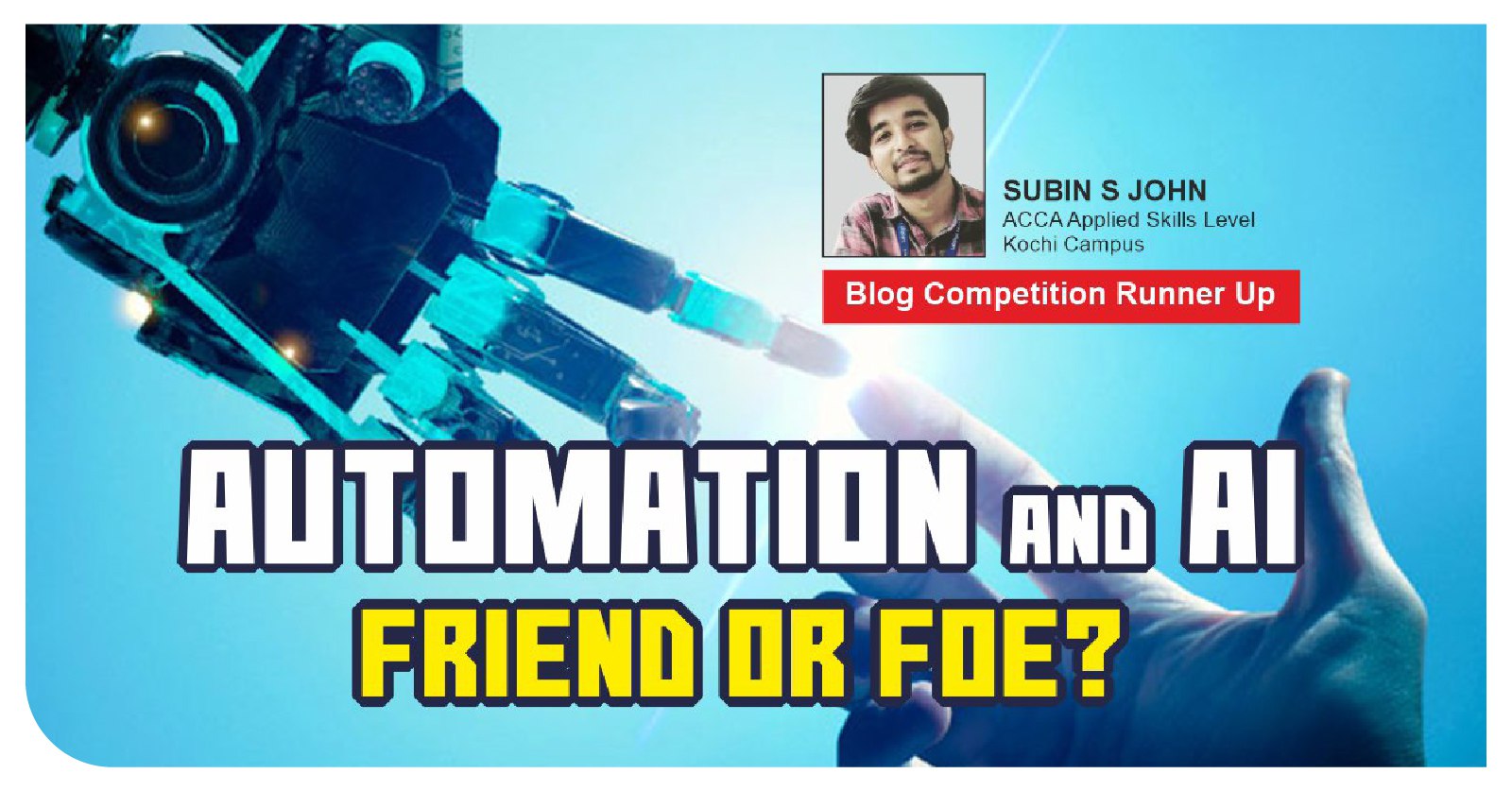CA, ACCA, CMA USA, CMA IND and CS Courses.
Apply NowThe advent of the fourth industrial revolution has a new fear creeping on the minds of existing and to be professional accountants-are their jobs at the risk of obsolescence?
A world where robots take up almost all the repetitive jobs does not remain a figment of our imagination anymore. It is already here. For example, Robotic process automation (RPA) the use of robots to perform repetitive rule-based tasks has shown to reduce timings on previously manual contractual obligations and audits on several months from weeks. RPA promises to increase the accuracy, timeliness, flexibility of data; boosting job satisfaction, Consequently, RPA is achieving near universal adoption in the next five years (source: Deloitte global robotic survey)
Automation has been around for decades… what’s different this time?
Machines are already being programmed to be capable of curing cancer, trading stocks and landing aircraft.
Accountants have always been able to grapple with waves of automation through the decades. From lotus 123 to excel, we have come a long way. However, AI is now capable of making decisions. For which, applications before required human intervention. And such, certain entry-level repetitive jobs are bound to disappear. Following a 2013 study, half of all jobs in the US would possibly be automated in the next two decades.
The arrival of Blockchain
Blockchain is a nascent offspring of financial technology (commonly known as FinTech) that possesses the potential to completely change the way we work and rely on data. Known as the ‘oil’ of modern economies. Gone are the days where Blockchain was solely used for transactions involving cryptocurrency. Its ‘ledger-like’ operating style, inability to ‘rewrite’ transactions once performed and decentralized nature is making it a very popular choice for businesses and non-governmental organizations to record and query the data and to present it faithfully to their users. The practical application of Blockchain is infinite, and it is here to change how accountants work with data. For example, Governments have expressed an interest in Blockchain technology to store public information. Accenture plans to revolutionize the insurance industry by developing Blockchain led solutions and services.
All these ominous paragraphs can be overwhelming to accounting students.
Is AI a villain?
Not at all! The job market for auditors and accountants is expected to show a growth of 10% by 2024! (This figure is faster than average and displays the demand of these professionals in the market. Source: Bureau of Labor Statistics)
The accounting exercise can be made more efficient with the integration of Blockchain. It promises to reduce the cost of maintaining and reconciling ledgers and at the same time would help accountants to focus more on work requiring predictive skills, namely planning and valuation. Giving rise to new opportunities, accountants will be needed to bridge the gap between technologists and business stakeholders. Hence, it is imperative that accountants understand the effect of Blockchain on their clients and businesses.
Are you ready for the future?
There is a shift in the accounting profession. From a previous role of assuring the accuracy of transactions and drafting of financial reports (a predominantly backend, number-crunching role) to the one having immense strategic prominence, the role of an accounting professional has transcended to providing excellent advice on a company’s future strategic and financial goals since they are seasoned with both financial and business nous.
The accounting industry is growing. Driven by a shift from computational to advisory roles. With more and more students opting to major in accounting and finance, the future of finance is ready to embrace YOU with open arms!
Reinvent yourself
83% of accountants already believe that learning about technology is as important to their job as accountancy itself (source: ACCA)
Anyone that struggles to adapt will not find a place in the new market. With global financial reporting trends tipping towards convergence and inclusion of more non-financial information, this calls upon the need to combine harder financial data with softer non-financial information for a comprehensible report for investors. Automation doesn’t prevent value-add. And thus, having a third-party(human) advice on how the business and books are being run would always be an indispensable aid to the business.
Integrated reporting <IR> which has been made mandatory for South African listed companies strives to standardize the ‘comprehensive report’ outlined above. Non-financial factors are responsible for the sustenance of the company and therefore Professional accountants should develop the skills to provide all-inclusive corporate reporting, which tells less about the numbers and more about the narrative and strategy of the organization. Accountants will have to be involved in the strategy of the companies they work with. Developing solutions to key issues and advising the c-suite executives, rendering value.
Developing opportunities
Advances in automation are creating opportunities for accounting professionals to alter their profile in business radically and as such, accountants are now focusing more on the service and ‘human’ aspect of their profession. Employers are looking for individuals with a creative flair since manual dexterity is now achievable through machines. With machine learning and technology evolving at an unbeatable pace, the future possibly beholds an integration of finance, technology and information systems, giving birth to new hybrid professionals such as the ‘chief financial technology officer (CFTO)’ or ‘chief financial information officer (CFIO)’ (IMA and ACCA’s study on bigdata)
To boost and maintain their employability, professional accountants should be able to keep up with the pace of digital change. This necessitates adequate training and development in data analytics and technology along with rigorous training in their relevant domains. As said, AI (artificial intelligence) will not replace accountants but accountants using AI will.

 ABOUT LAKSHYA
ABOUT LAKSHYA  WHY CHOOSE LAKSHYA
WHY CHOOSE LAKSHYA  MISSION AND VISION
MISSION AND VISION  CHARTERED ACCOUNTANCY (CA)
CHARTERED ACCOUNTANCY (CA)  ACCA
ACCA  CMA-USA
CMA-USA  RESULTS
RESULTS 


